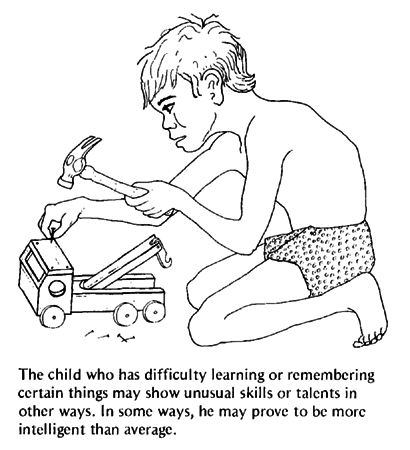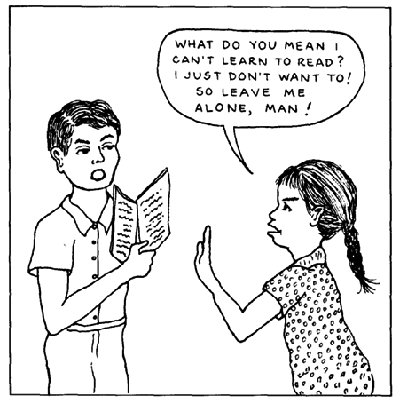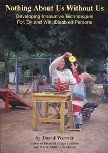CHAPTER 41
'Learning Disabilities' in Children with Normal Intelligence

Some children, whose minds in most ways seem quick and normal, have difficulty learning or remembering certain things.
For example, a child may have great difficulty learning to read, often mixing up certain words, letters or numbers. Or he may have trouble remembering names of persons, things or places. These 'blocks' to learning may happen in a child who is as intelligent, or even more intelligent, than most children the same age.
In developed countries at least one child in 30 is thought to have a learning disability. In poor countries nobody knows how many. Any child who in the first years of life seems to develop abilities and understanding about as quickly as other young children, yet at a certain age begins to show difficulty learning or remembering certain things, may have this kind of 'special learning disability' (or call it what you like). Often these children are unusually active, have a hard time sitting still, or may develop certain behavior problems.
WHAT TO DO
| These children (even more than most) have a great need for love, understanding, and appreciation of the things they do well. | |
| It is very important not to treat these children as stupid or 'retarded'. Praise the child and try to help her develop in areas where she shows interest or ability. | |
| Often the best way to help a child learn in the area where she has special difficulty is to introduce it, little by little, through activities the child likes and can do well. |
For example, a child who has difficulty learning and using numbers, but likes building things, can gradually begin to take measurements for cutting and shaping the pieces for the things he builds.

| Do not blame, scold or punish the child for not learning, or for 'not trying'. This may only make things worse. A child can easily become frustrated with her special learning difficulty. Trying to force or shame her into learning can make her more restless, angry, or rebellious. Some children will not admit to themselves and others that they have trouble learning something. Instead they hide their difficulty by pretending they do not want to learn. Thus a child who has a special learning disability may be mistaken for one who is simply stubborn, lazy or a trouble- maker. The child may become defensive and uncooperative. You will need to show a lot of understanding, patience, and proof of your respect for the child in order to win his trust and cooperation. But after trust and respect are established, he may become as eager and considerate as he was stubborn and troublesome before. |
| Special help with learning may be needed. It often works best to move forward in small steps, with much repetition, so that the child finds it easier and gains confidence. (See Chapter 34.) Make study periods short and mix them with activities that the child likes. And of course, try to make learning fun. | |
| Let the child learn, and use what she learns, at her own speed. Do not hurry her. Help her to relax. It has been found that when children who have difficulty with reading or writing are given all the time they need to take tests, they often do as well as other students. | |
| Some very intelligent children never learn to read or write. Some of these children, if given a chance to study with the help of tape recorders or other means, have completed university degrees. Others have preferred to leave school and learn other skills. Many have become leaders in their communities or work places. What is important is to help and encourage these children to develop in the areas where they are strongest. |
| WARNING: Some doctors are quick to treat learning disabilities with medicines-especially when the children are very active. Use of medicine is often not helpful, and may do more harm than good. Try to get advice from several experienced persons before giving any medicines. |


